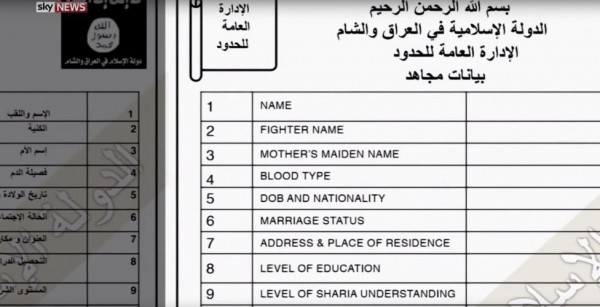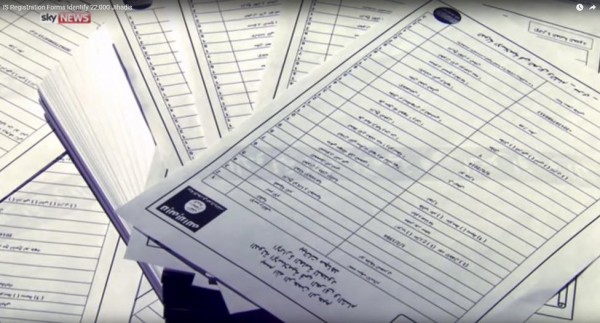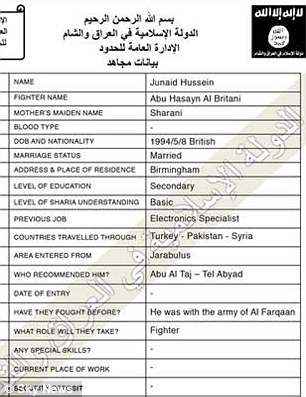
A disillusioned former member of Islamic State has passed a stolen memory stick of documents identifying 22,000 supporters in over 50 countries to a British journalist, a leak that could help the West target Islamist fighters planning attacks.
Leaks of such detailed information about Islamic State are rare and give Britain’s spies a potential trove of data that could help unmask militants who have threatened more attacks like those that killed 130 people in Paris last November.
A man calling himself Abu Hamed, a former member of Islamic State who became disillusioned with its leaders, passed the files to Britain’s Sky News on a memory stick he said he had stolen from the head of the group’s internal security force.

On it were enrolment forms containing the names of Islamic State supporters and of their relatives, telephone numbers, and other details such as the subjects’ areas of expertise and who had recommended them.
One of the files, marked “Martyrs”, detailed a group of IS members who were willing and trained to carry out suicide attacks, Sky said.
Richard Barrett, a former head of global counter-terrorism at Britain’s MI6 Secret Intelligence Service, said the cache was “a fantastic coup” in the fight against Islamic State.
“It will be an absolute goldmine of information of enormous significance and interest to very many people, particularly the security and intelligence services,” Barrett told Sky News.
Sky said it had informed the British authorities about the documents which were passed to its correspondent, Stuart Ramsay, at an undisclosed location in Turkey.
Western security sources said that if genuine, the files could be gold dust as they could help identify potential attackers and the networks of sympathizers behind them, and give insight on the structure of the group.
Reuters was not able to independently verify the documents, given their provenance. A selection of them was published in Arabic.
Islamic State militants claimed responsibility for the Nov. 13 attacks in Paris and the Oct. 31 downing of a Russian passenger plane over Egypt’s Sinai region that killed 224. They have promised more attacks on the West and Russia.
SUICIDE BOMBERS


Western leaders say Islamic State, which has proclaimed a caliphate in the parts of Syria and Iraq it controls, now poses a greater danger to the West than al Qaeda. It uses a militant interpretation of Islam to justify attacks on its foes and the use of extreme violence, including rape and beheadings, against those it sees as infidels.
The defector, a former Free Syrian Army fighter who switched to Islamic State, said the group had been taken over by former soldiers from the Iraqi Baath party of Saddam Hussein, who was ousted in 2003 after the U.S.-led invasion of Iraq.
Some of the defector’s Arabic documents, posted on the Zaman Al Wasl Syrian news website, were forms issued by “Islamic State in Iraq and Sham, the General Directorate of Borders” and displayed personal details of each fighter, according to a review of some of the documents by Reuters.
The forms included answers to 23 questions such as assumed name, birthplace, education level, extent of Sharia learning and previous jobs, as well as details about the individuals’ journey to Islamic State and whether they were potential suicide bombers or more traditional fighters.
When asked for his view of the documents, Raffaello Pantucci, director of international security studies at London’s Royal United Services Institute, said in an emailed response: “It seems a bit dated.”
“Very interesting though and a real gift for researchers into understanding the group more,” he added. “The key for me in many ways is how this highlights the bureaucracy of the organization once again – kinda like al Qaeda in fact.”
REUTERS

Leave a Reply
You must be logged in to post a comment.